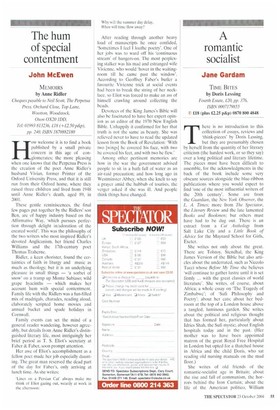The hum of special contentment
John McEwen
MEMOIRS by Anne Ridler Cheques payable to Neil Scott, The Perpetua Press, Orchard Close, Top Lane, Wootton, Woodstock, Oxon 0X20 1DD, Tel: 01993 813236, £18 ( +12.50 p&p), pp. 240, ISBN 1870882180 How welcome it is to find a book published by a small private concern in this age of conglomerates; the more pleasing when one knows that the Perpetua Press is the creation of the poet Anne Ridler's husband Vivian, former Printer of the Oxford University Press, and that it is still run from their Oxford home, where they raised three children and lived from 1948 until Anne Ridler's death, aged 89, in 2001.
These gentle reminiscences, the final few pages put together by the Ridlers' son Ben, are of happy industry based on the Affirmative Way, 'which pursues perfection through delight in/adoration of the created world'. This was the philosophy of the two writers who most inspired Ridler's devoted Anglicanism, her friend Charles Williams and the 17th-century poet Thomas Traherne.
Ridler, a keen chorister, found the certainties of faith in liturgy and music as much as theology; but it is an underlying pleasure in small things — 'a sorbet of snow' on a tramp up Monte Subiaso; wild grape hyacinths — which makes her account hum with special contentment. Family life with the Ridlers was a fun-filled mix of madrigals, charades, reading aloud, elaborately scripted home movies and annual bucket and spade holidays in Cornwall.
Family events can set the mind of a general reader wandering, however agreeably, but details from Anne Ridler's distinguished literary life, most intriguingly her brief period as T. S. Eliot's secretary at Faber & Faber, soon prompt attention.
Her awe of Eliot's accomplishment as a fellow poet made her job especially daunting. The great man reserved the dead part of the day for Faber's, only arriving at lunch time. As she writes:
'Lines on a Persian Cat' always make me think of Eliot gazing out, wearily at work in the afternoon:
After reading through another heavy load of manuscripts he once confided, 'Sometimes [feel I loathe poetry'. One of her jobs was to ward off his 'continuous stream' of hangers-on. The most perplexing stalker was his mad and estranged wife Vivienne, who would 'hover in the waitingroom till he came past the window'. According to Geoffrey Faber's butler a favourite Vivienne trick at social events had been to break the string of her necklace, so Eliot was forced to make an ass of himself crawling around collecting the beads.
Devotees of the King James's Bible will also be fascinated to have her expert opinion as an editor of the 1970 New English Bible. Unhappily it confirmed for her that truth is not the same as beauty. She was relieved never to have to read the updated lesson from the Book of Revelation: 'With two [wings] he covered his face, with two he covered his feet, and with two he flew.'
Among other pertinent memories are how in the war the government advised people to sit in a bath full of water as an air-raid precaution; and how long ago in Westminster Abbey, when she knelt to say a prayer amid the hubbub of tourists, the verger asked if she was ill. And people think things have changed.
























































































 Previous page
Previous page